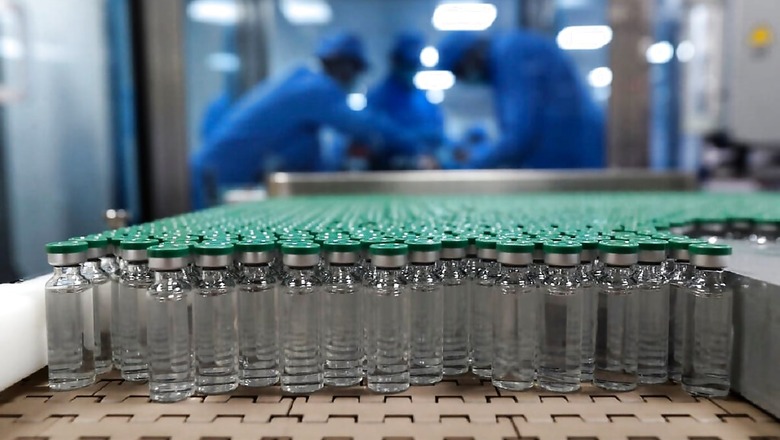
views
Pfizer Inc on February 5 withdrew its application for emergency-use authorisation of its Covid-19 vaccine in India. “Based on the deliberations at the meeting and our understanding of additional information that the regulator may need, the company has decided to withdraw its application at this time,” it said in a statement to Reuters.
India began its Covid-19 vaccination drive on January 16, inoculating half a million people with Serum Institute of India (SII) and Bharat Biotech vaccines.
Here is a status check on the other vaccines that will be used in India:
Covishield
SII is manufacturing and distributing Covishield with a licence from AstraZeneca-Oxford University. The government has so far procured 11 million doses of SII’s Covishield. The Centre on Wednesday placed a second purchase order with SII for the supply of one crore doses of the vaccine, each costing Rs 210, including GST, sources said. This vaccine has been developed by the University of Oxford and British-Swedish pharmaceutical company AstraZeneca.
Covaxin
The Centre has procured 5.5 million doses of Bharat Biotech’s Covaxin. The government has said it would procure Covid-19 vaccines in a staggered manner. Covaxin has been developed by Indian biotechnology company Bharat Biotech and clinical research body Indian Council of Medical Research (ICMR).
The company on March 3 announced its phase three results, stating that the vaccine has shown 81% interim clinical efficacy. Covaxin is an inactivated vaccine — one of the oldest methods for vaccinating people – which means that whole, inactivated viruses are injected in the body to trigger an immune response. These whole batches of coronavirus must be grown, “killed” using a chemical or heat and then made into a vaccine, making it a longer process. Beneficiaries who receive Covaxin will be paid compensation if they suffer adverse event due to the vaccine.
Moderna
Moderna’s Covid-19 vaccine has been developed based on genetic material or mRNA. It has been approved for emergency use in the United States, European Union, United Kingdom, Canada and Israel. With efficacy of 94 percent and cold storage requirement of between -25 degree Celsius and -15 degree Celsius, the vaccine is being sought by many countries.
It is not known when the Moderna vaccine will be available in India. Officially, Moderna has not made any request for emergency use in the country yet. According to the government, the vaccine is priced at $32- $37 per dose – a high price by Indian standards. There is a possibility that the Moderna vaccine may be made availabile through COVAX, if global collaboration enters into its procurement.
Sputnik V
The Covid-19 vaccine developed by Moscow’s Gamaleya Institute, Russian Defence Ministry and the sovereign Russian Direct Investment Fund became the first to be cleared for public use. It is based on a modified human adenovirus as a vector. The vaccine’s efficacy is said to be about 91.4 percent based on data analysis of the final control point of clinical trials in Russia.
In India, Dr Reddy’s is currently doing a bridge trial for the vaccine and expects the data to be ready by March. The vaccine has to be given in two doses. Its storage temperature requirement is 2-8 degrees Celsius. It will also be available in freeze-dried formulation, making it much more stable to use in mass vaccination. Dr Reddy’s and Hetero will produce up to 200 million doses of the vaccine. The vaccine will be priced less than $10 per dose.
Johnson & Johnson
Johnson & Johnson’s Covid-19 vaccine Phase-3 efficacy data is expected to be announced by next week. The vaccine is based on a modified human adenovirus as a vector. Depending on the outcome of Phase-3 readout, the company plans to apply for emergency use in the US and other countries.
Unlike other vaccines which require two doses, the J&J vaccine will be administered in a single shot, making it convenient those taking the shot as well as the government bodies struggling to scale-up the mass rollout. It also greatly simplifies logistics and scalability. The vaccine’s storage temperature requirement is 2-8 degrees Celsius.
The J&J vaccine may be available in India in the first half of 2021. Indian vaccine maker Biological E has entered into an agreement with J&J to manufacture the drug substance and finished product of the vaccine.
Novavax
The US-based biotech Novavax is developing a protein sub-unit vaccine that uses part of the virus and combines with adjuvant, or booster.
In India, the vaccine would be manufactured and distributed by its partner SII, with which Novavax has an agreement to produce around 2 billion doses a year. SII said it plans to begin a bridge trial in India in February 2021.
In the initial phase, India will inoculate about one crore healthcare workers. These will be followed by two crore front-line workers, police, armed forces, municipal workers, revenue staff and others. In the third phase, 27 crore people above 50 years of age and those with co-morbidities like diabetes, hypertension, and organ transplant patients will get the vaccine.
Read all the Latest News, Breaking News and Coronavirus News here



















Comments
0 comment